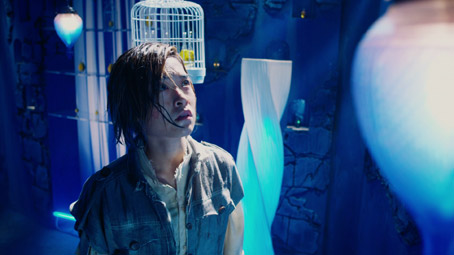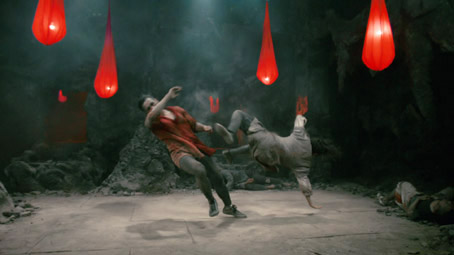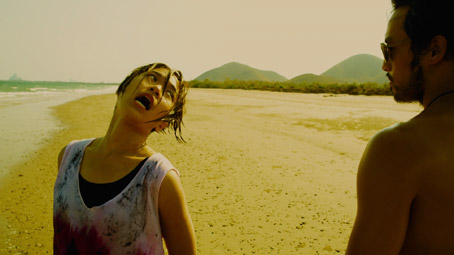|
There are times when Thai martial arts cinema resembles a relay team that put its best runner in first and then watched on as the temporary advantage it gave them started to slip. Ong-Bak was not just a great martial arts film, it was a small miracle of release timing, bringing a blistering old-school physicality to the genre when its Hong Kong equivalent had become a bit too reliant on CG and wire work and was losing its most prominent stars to Hollywood. It reminded us what martial arts cinema used to be all about, and introduced us to a new star in Tony Jaa and a fighting style not widely seen in the west in the shape of Muay Thai, whose full contact viciousness had even the likes of Jackie Chan questioning its brutality.
Since then we've been waiting for Thai action filmmakers to make good on the promise of this opening salvo. Jaa's second big outing, Warrior King [Tom yum goong] had enough show-stopping set-pieces to keep interest simmering, but his cameo appearance in the 2004 The Bodyguard proved to be the high spot in an otherwise limp mix of action and comedy built around the talents of Jaa's Ong-Bak co-star, Petchtai Wongkamlao. The impressive action of the 2004 Born to Fight [Kerd ma lui], meanwhile, was almost lost in the film's overwrought nationalist sentimentality. And then there was Chocolate, directed by Ong-Bak's Prachya Pinkaew and starring young female newcomer Jija Yanin as an autistic fighter with a fondness for candy, another nice try that fell short of the high bar that Jaa and his collaborators had set. But it made enough of a mark to ensure that we'd be seeing more of Jija, and the follow-up is finally here it is in the shape of Raging Phoenix [Deu suay doo], a film that, for this genre fan at least, lives up to expectations but falls some way short of hopes.

Jija stars as Due, a rock band drummer who loses her rag during a gig when she realises her boyfriend's been cheating on her, which ends with her losing both her pertner and her job. In a subsequent drunken stupor she collides with a woman, who bundles her into a waiting van. In the ensuing struggle the woman is stabbed and Deu escapes, but is aggressively pursued by the woman's cohorts. Before they can nab her she's rescued by Sanim (Kazu Patrick Tang), who fights off a band of bouncing warriors and then takes the battle to their warehouse hideout, where he and his friends lay waste to their comrades and free the women they've been kidnapping for sex slavery. Impressed with their unusual drunken fighting style, Deu asks them to train her so that she can rescue the sister of one of the girls they have freed.
Not everything here is quite what it seems, but one small but satisfying twist aside, the story plays out pretty much as the genre dictates, with Sanim and the boys – whose translated names are (I kid you not) Dogshit, Pigshit and Bullshit – looking to bring down the sex slave trade operators and rescue Sanim's abducted wife Pie (also not a typo). Since this is not a crime thriller, locating the underground hideout proves surprisingly easy, thanks to a kidnapping, some accidentally spilt pheromones and Dogshit's super-sensitive nose.
As with almost any martial arts movie, the prime purpose of these shenanigans is to get our protagonists from one fight to another, and it's here that the film in question either sinks or soars. Raging Phoenix floats somewhere between the two. The filmmakers' decision to create a new style of martial art – one that blends traditional fight moves with B-boy dance steps – has intriguing and often entertaining results, but results in fights whose creative elegance lack both the brute force of Ong-Bak and the speed and dizzying complexity of recent Hong Kong genre cinema. Part of the blame sits with director Rashane Limtrakul's camera placement and editing decisions, which sometimes detract from action that they should be enhancing, but in almost every fight there are a number of blows that clearly do not deliver the impact that their recipient's reaction and the overly loud sound effects try so hard to suggest.
Stylistically, the surrounding drama is a victim of current trends, with a distracting use of heavy colour tints and eye-poking camera angles, both of which peaks when Deu is set up for a marketplace kidnap, with picture-book matte work and MTV editing also tossed into the mix. Particularly disappointing is the limp handling of Due's training sequence, a traditional genre high point that here is seriously lacking in spark, and the whole concept of a drunken fighting style is saddled with an air of déjà-vu, being central to Jackie Chan's Drunken Master, an acknowledged genre classic from 1994 whose dynamite set-pieces easily outshine their equivalent here.

But eighty-five minutes in, all of that changes when Deu and Sanim take on muscular female super-villain Jaguar London (played by award-winning female bodybuilder Roongtawan Jindasing) on three overlapping rope bridges whilst simultaneously trying to keep the unconscious Pie from falling into the abyss below. Seriously, even if you're not grabbed by the early fights then you owe it to yourself to stick with the film for this scene alone, a dazzlingly choreographed and inventively acrobatic battle that allows Yanin, Tang and Jindasing to really show what they can do. The climactic face-off between Deu and London is also no slouch, with the brutality upped just enough to convince us that the two are actually fighting rather than running through a slick rehearsal for the same.
On the strength of just two films, Jija Yanin has built up enough of fan base to ensure that my view of this film will be a minority one, and I've no problem with that. Even within the confines of the genre there is plenty of room for variances in taste and fighting style preferences, and what doesn't really work for me has clearly delighted others. If you're a Jija fan, and there are plenty of you out there, then by all means go ahead and lap up every elegantly executed move and stylised shot. As for me, well there's enough good stuff in that final half-hour to keep me on board for Jija's next outing.
Another film transfer that's (probably) been slightly modified to fill that 1.78:1 widescreen TV. But in other respects this is a solid job, at least within the confines imposed by the film's stylised visuals, with the sometimes heavy use of filter effects narrowing the contrast range and taking the edge off the sharpness. But when the filtration is decreased then the quality shines through, as in the precision rendering of the beads on the young female Japanese prisoner at the start of chapter 6, and the hair and skin textures on facial close-ups throughout. Darker scenes retain their integrity, but don't have the punch of the daytime exteriors.
The DTS HD Master Audio 5.1 Thai soundtrack is a sprightly affair, shining on clarity and range and boasting a sometimes excellent use of directional effects – the first big fight with hooded warriors wearing jumping stilts plonks you square in the middle of the action and surrounds you on all sides with specifically located sounds of battle. Outside of the action scenes, things can be a little front and centre weighted (except the music, which is always spread around). Those loud impact noises have the expected degree of bass thump.
The bulk of the extras are a series of brief Interviews with key cast and crew members, taken from what looks like the Thai DVD/Blu-ray.
Director Rashane Limtrakul (4:16) talks about his desire to create a new type of martial arts movie, one built around a love story that uses a new style of dance-influenced fighting. The interview is heavily jump-cut, setting the style for some of those that follow.
Action Choreographer Weerapon Phumatfon (3:24) briefly discusses a couple of the action scenes, but mainly focuses on Jija, the moves she had to learn and her progression from Chocolate.
Nui Sandang (2:17), who plays Lhee-muu/Pigshit, talks about his character and the film's unique mix of martial arts and dance moves.

Kazu Patrick Tang (5:12), the French-born Trickz martial arts champion who plays Sanim, outlines his character and enthuses about working on the film and with Jija, with whom he trained for four years. This one interview is conducted in French with Thai subtitles, which are then subtitled in English.
Lead player Jija Yanin (4:22) talks about her character, working with co-star Tang, and the differences between this film and Chocolate.
Somphong Leartvimolkasame (2:39), who plays Kee-mha/Dogshit, discusses his character and his specific fighting moves and why they had to be adapted to work on location. He ends with a to-camera promo for the film.
Boonprasert Salangam (2:19), who plays Kee-wai/Bullshit – the most visually interesting member of the gang – briefly covers the training he undertook and the problems of performing B-boy dance moves in sometimes confined locations.
Roongtawan Jindasing (2:47), who plays super-villain Jaguar London, describes her character, her preparation for the role and gives the film a real push.
B-Roll Action Scene Footage (6:51)
Behind-the-scenes footage of the rehearsal and shooting of some of the action scenes, but not my favourite one.
Also included are the Original Trailer (3:26), which is letterboxed in the middle of the screen, and the UK Trailer (1:43), which is a promo for this very disc and narrated by Trailer Voice Man.
An attempt at a new take on martial arts action that will work a treat for some but felt a little to 'performed' for me, with real contact blows mixed with a few too many moves that play like punch-pulled rehearsals for the final thing. Jija certainly has charisma and it's always great to see a female star make good in a still largely male-dominated genre. Cine Asia's Blu-ray is solid enough, though more for soundtrack and the better aspects of the transfer than the insubstantial extras.
|